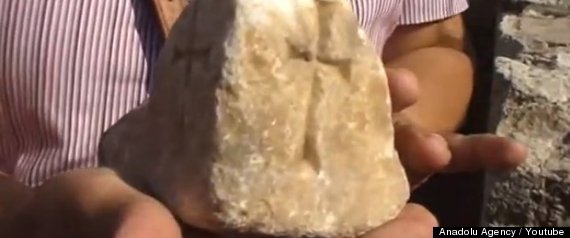
Archaeologists working in Turkey believe they have found a piece of the cross that Jesus was crucified on.
While excavating the ancient Balatlar Church, a seventh-century building in Sinop, Turkey, on the shores of the Black Sea, they uncovered a stone chest that contained objects that may be directly connected with Jesus Christ.
Excavation head Professor Gülgün Köroğlu definitively stated:
Many churches claim to possess relics of the so-called "true cross," though the authenticity of the items is not fully accepted by scholars and scientists. Protestant theologian John Calvin noted that, "if all the pieces that could be found were collected together, they would make a big ship-load," referring specifically to the cross. On the other hand, the 19th-century French archaeologist Charles Rohault de Fleury supposedly said that all of the catalogued relics would only make up less than a third of the mass of a roughly 12-foot-high cross.
But what originally happened to Jesus' cross, and why has it turned up now? Legend says that Emperor Constantine's mother, Helena, found the cross in Jerusalem and distributed pieces of the wood to religious leaders in Jerusalem, Rome, and Constantinople.
Balatlar Church, built in 660, has proved an especially rich dig site, as Köroğlu mentioned that in addition to the stone chest, her team has found the ruins of an ancient Roman bath and more than 1,000 human skeletons since they started working in 2009.
This video shows more footage of the dig, including the stone chest itself:
This discovery provides further evidence of the historical Jesus, a man who really existed in ancient Palestine, who is the subject of the much-publicized book "Zealot: The Life and Times of Jesus of Nazareth," by Reza Aslan.
#huffingtonpost
While excavating the ancient Balatlar Church, a seventh-century building in Sinop, Turkey, on the shores of the Black Sea, they uncovered a stone chest that contained objects that may be directly connected with Jesus Christ.
Excavation head Professor Gülgün Köroğlu definitively stated:
We have found a holy thing in a chest. It is a piece of a cross, and we think it was [part of the cross on which Jesus was crucified]. This stone chest is very important to us. It has a history and is the most important artifact we have unearthed so far.The stone chest has been taken to a laboratory for further testing. However, the appearance of the chest suggests that it was a repository for the relics of a holy person, according to the team, who showed reporters at the site a stone with crosses carved into it.
Many churches claim to possess relics of the so-called "true cross," though the authenticity of the items is not fully accepted by scholars and scientists. Protestant theologian John Calvin noted that, "if all the pieces that could be found were collected together, they would make a big ship-load," referring specifically to the cross. On the other hand, the 19th-century French archaeologist Charles Rohault de Fleury supposedly said that all of the catalogued relics would only make up less than a third of the mass of a roughly 12-foot-high cross.
But what originally happened to Jesus' cross, and why has it turned up now? Legend says that Emperor Constantine's mother, Helena, found the cross in Jerusalem and distributed pieces of the wood to religious leaders in Jerusalem, Rome, and Constantinople.
Balatlar Church, built in 660, has proved an especially rich dig site, as Köroğlu mentioned that in addition to the stone chest, her team has found the ruins of an ancient Roman bath and more than 1,000 human skeletons since they started working in 2009.
This video shows more footage of the dig, including the stone chest itself:
This discovery provides further evidence of the historical Jesus, a man who really existed in ancient Palestine, who is the subject of the much-publicized book "Zealot: The Life and Times of Jesus of Nazareth," by Reza Aslan.
#huffingtonpost